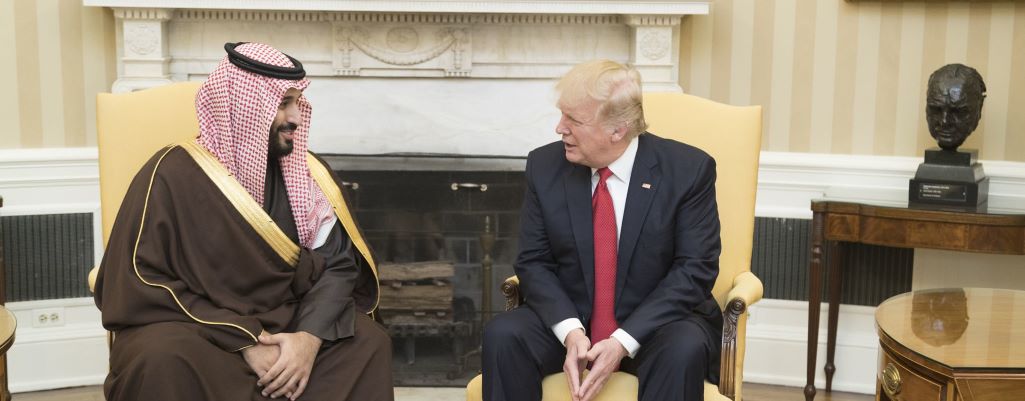Washington, DC —19 November 2025
The Saudi Crown Prince, Mohammed bin Salman (MBS), is in Washington, DC, for a White House visit that has sparked intense debate—not only about geopolitics and investment, but about fundamental human rights. While the Trump administration has marked the visit with red-carpet diplomacy, an Oval Office press conference, and a formal dinner, it represents more than a strategic reset. It reflects a troubling pattern of prioritizing business and security interests over accountability and justice.
Jamal Khashoggi
The 2 October 2018 killing of Jamal Khashoggi continues to shape international perceptions of Mohammed bin Salman’s leadership. U.S. intelligence assessments, including those from the Office of the Director of National Intelligence (ODNI), concluded that MBS approved the operation that led to the journalist’s murder inside the Saudi consulate in Istanbul.
This conclusion was supported by multiple sources, including recordings obtained by Turkish intelligence, which had previously surveilled the consulate. Agnes Callamard, the United Nations Special Rapporteur on extrajudicial killings, reviewed the evidence and submitted her findings to the Human Rights Council, which determined that Khashoggi’s death constituted a “state killing.”
For many, MBS’s return to the White House signals a normalization of his international standing despite the gravity of that case. During the Oval Office press briefing, questions regarding Khashoggi’s killing were met with deflection, reflecting a broader reluctance to confront the issue directly in diplomatic settings.
Donald Trump dismissed concerns, stating: “You’re mentioning somebody that was extremely controversial… Whether you liked him or didn’t like him, things happen.” He went on to absolve MBS despite U.S. intelligence assessments indicating high-level approval of the operation. The implication is stark: the “leader of the free world” publicly downplayed a killing widely assessed to have been authorized at the highest levels of government.
Accountability remains essential. Calls for justice should not be constrained by political status, including when those implicated hold positions of power.
Surge in Executions
Under MBS’s leadership, Saudi Arabia has carried out an alarming number of executions, with 2024 and 2025 marking the highest figures in the country’s modern history. In 2024 alone, 345 individuals were executed, surpassing the previous high of 196 in 2022. In the first half of 2025, at least 180 executions have already been recorded.
This sharp increase contradicts MBS’s 2018 public statements that the Kingdom would significantly reduce its use of the death penalty.
A significant proportion of those executed are foreign nationals, many of whom face barriers to legal representation and language access. Numerous cases involve nonviolent offenses, raising serious concerns under international legal standards, which restrict capital punishment to the “most serious crimes.” Many convictions follow proceedings that fall short of fair trial standards, including reliance on confessions allegedly obtained under torture.
The pattern suggests the use of capital punishment not only as a judicial measure, but as a mechanism of control.
Silencing Dissent
Freedom of expression remains severely restricted. Journalists, writers, and social media users continue to face arrest and long prison sentences for peaceful expression. In many cases, individuals are detained for online posts advocating modest reforms or highlighting social grievances.
The case of Raif Badawi remains emblematic. Arrested in 2012, he was sentenced to 10 years in prison, 1,000 lashes, and a substantial fine for operating an online forum and expressing liberal views deemed offensive to religious authorities.
On 9 January 2015, Badawi received 50 lashes in a public square in Jeddah, in front of the Al Juffali Mosque. The punishment, carried out after Friday prayers, drew international condemnation. The remaining lashes were ultimately suspended due to sustained global pressure and medical concerns.
Badawi was released on 11 March 2022 after completing his sentence. However, he remains subject to a 10-year travel ban and a 10-year prohibition on media engagement, preventing him from reuniting with his family, who were granted asylum in Canada.
Calling for Change
The visit presents an opportunity for the United States to more explicitly integrate human rights into its bilateral engagement with Saudi Arabia.
This includes calling for the release of individuals detained for peaceful expression, ending arbitrary travel bans, and ensuring that those affected—including dual nationals and U.S. citizens—can leave or return freely. Structural reforms to the Saudi justice system are also necessary to guarantee fair trials, access to legal counsel, and protection from torture. A genuine moratorium on executions, particularly for nonviolent offenses, remains critical.
Given Saudi Arabia’s regional influence, the visit also carries broader implications. Mohammed bin Salman is in a position to press for shifts in U.S. policy, including increased humanitarian access in conflict zones such as Gaza.
More broadly, the United States risks reinforcing a message that human rights abuses may be overlooked when strategic interests are at stake. Such signaling undermines international norms and weakens global credibility. Arms agreements, investment partnerships, and security cooperation may serve immediate policy goals, but without parallel commitments to reform, they risk entrenching repression.
The visit underscores a persistent tension in U.S. foreign policy: the balance between strategic interests and the promotion of human rights. How that balance is managed will shape not only bilateral relations, but the broader credibility of the United States in advancing international legal and moral standards. Centering human rights in engagements with Mohammed bin Salman is not a diplomatic liability—it is a necessary condition for a credible and sustainable partnership.
Photo credit: Foreign Leader Visits by The White House is marked with Public Domain Mark 1.0 for public use.

